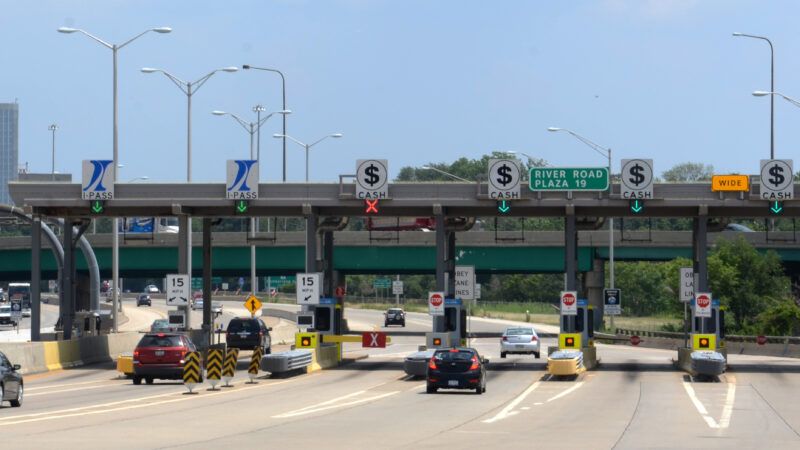Infrastructure Bill Tries To Boost Number of Toll Roads While Exempting Almost All Drivers From Tolls
A new grant program that would help states set up privately operated toll roads would also forbid charging tolls to anyone making under $400,000 a year.

One consequence of Congress trying to do everything infrastructure-related in one big, hastily put-together bill is that many new programs are effectively designed to fail. For example: a program that tries to boost the number of privately operated toll roads in the country while also exempting almost all drivers from paying tolls.
Tucked inside the 2,700-page, $550 billion bill passed by the Senate last week is a program that would give states, localities, and other government bodies grants to assist them in leasing out their roads to private infrastructure companies.
The idea behind leasing out government roads would be to tap private capital, which could then pay for new infrastructure projects or fund the repair of existing aging assets. These asset concessions are common enough in Europe and Australia. Most state and local governments have little experience with them, however.
Enter the infrastructure bill's technical assistance grants. State, local, or tribal governments could receive up to $2 million to hire staff to work on concession agreements, identify assets that could be leased out, and solicit bids from private infrastructure firms.
This is one way states could rebuild an Interstate Highway System that's nearing the end of its useful life, says Robert Poole, director of transportation policy at the Reason Foundation (which publishes this website).
"There's no replacement federal program to do about what's estimated to be a $1 trillion rebuilding over the next twenty years. They're ideally situated for toll financing," says Poole. "You lease a non-tolled [road] with the idea that you charge tolls instead of the fuel taxes and finance the reconstruction and you get something good for another 50 or 75 years as the country keeps growing."
Tolling existing Interstate highway lanes is currently prohibited, so further reforms would be required before those could be leased out to private companies. But there is no such restriction on non-Interstate highways. That includes many urban highways that could be tolled to pay for repairs or cut down on congestion.
If a state wants to take advantage of these grants, though, it would have an impossible time finding an infrastructure company willing to lease their roads. Any concessionaire doing business with a government that has accepted one of these grants would be forbidden from charging tolls or other user fees on anyone making under $400,000 a year.
"You wouldn't have anywhere near the toll revenue stream that you'd need" to finance repairs or pay back investors, Poole says. He adds that there's no obvious way to determine a driver's income. "Cars just go driving through. How do you know the household income of any individual vehicle is? It's an unworkable idea, and it means that this whole program wouldn't get anywhere."
President Joe Biden has been adamant that he would not raises taxes on people earning under $400,000 a year. And as far as his administration is concerned, that includes user fees to fund infrastructure.
The limitation on tolling anyone making under $400,000 thus appears to be a political expediency added to the bill to either prevent objections from Biden and/or guard against Republican accusations that the bill increases taxes.
The upshot is that no government will actually make use of these technical grants. They would allow states to build capacity to make asset concession agreements, while also imposing a condition that would make those concession agreements unviable.
The House is currently considering the infrastructure bill, so there's still the chance that this provision could be amended. But the House Democrats' INVEST In America Act—passed earlier this year—was even more anti-tolling than what the Senate has passed. Those same Democrats are likely not that keen on making tolling easier now.
Poole says that the self-undermining asset concession program is just one example of a worrisome drift in transportation policy away from charging people for the infrastructure they use.
"Everything they're talking about in terms of additional infrastructure," says Poole. "It's all done with borrowed federal money instead of 'the user pays, the user benefits.' It's a very terrible direction for federal policy to be going in."
Rent Free is a weekly newsletter from Christian Britschgi on urbanism and the fight for less regulation, more housing, more property rights, and more freedom in America's cities.


Show Comments (110)